Starmer and Reeves may already be done for, but it could still get worse
Labour’s leaders look useless and paranoid, and their political futures appear more precarious by the day

The political sands shift with such speed these days that by the time you read these words they may already be out of date. Here goes, anyway.
What’s now abundantly clear is that Downing Street lacks both the backbone and political support for the hard decisions needed to put the public finances back on a sustainable footing.
Growing speculation and confusion over what the Chancellor, Rachel Reeves, might do in her second Budget has moreover created a toxic mix of ruinous fiscal uncertainty and falling economic confidence.
The latest volte face – swapping back from the widely trailed “one big hit” plan of breaking with manifesto promises in raising the rate of income tax by 2p in the pound, to the previous so-called smorgasbord approach of lots of itsy-bitsy little growth-restraining tax rises – has further added to the sense of bewilderment.
But please don’t call this getting cold feet in the face of a backbench rebellion. No, somehow or other the Office for Budget Responsibility has been persuaded to slightly upgrade its economic forecasts, making the size of the fiscal challenge somewhat smaller than once thought.
Believe it if you will. As likely as not, the smorgasbord will fail to satisfy, and before long Reeves will be back for more.
Just to make matters even worse, there’s a self-inflicted political crisis piling in on top. If anyone knows what’s going on, please tell the financial markets, for the only conclusion they can draw from the shenanigans of the last week is that we are governed by a ship of fools.
For now, Sir Keir Starmer, the Prime Minister, seems to have seen off any nascent leadership challenge, if indeed that is what it was.
Chances are that the whole thing was imagined. Yet Downing Street went on full offensive regardless. The charge of paranoia must now be added to that of incompetence.
If there was a rebellion in the making, it died before it got going, and farcically, before we even got to know who was behind it.
Not me, says Wes Streeting, the Health Secretary, whose carefully nurtured nice-boy persona cannot disguise an icy ambition intent on pushing Sir Keir out.
Just because Sir Keir is paranoid doesn’t mean they aren’t out to get him. Even loyalists admit that he’s completely useless. The insurgents will be back sooner or later, I imagine, and when they return it won’t be just Sir Keir who is forced to walk the plank.
Also quitting Downing Street will be Rachel Reeves, his Chancellor. It is impossible to imagine one without the other. Their political fortunes are joined at the hip, and now look more precarious by the day.
Their predicament is hardly unique. Look around the world and virtually all democratically elected incumbent governments are in deep trouble.
Of course, there are some notable exceptions – among them Argentina’s Javier Milei, who has recently strengthened his grip on power, and Italy’s Giorgia Meloni, who three years into her premiership remains relatively popular.
But these are both countries previously regarded as political and economic basket cases; the popularity of their leaders rests on the promise of decisive change after decades of turmoil, failure and instability.
It’s also true that Canada’s Mark Carney continues to enjoy relatively favourable approval ratings. But it’s early days in his case, and his popularity is almost entirely built on the territorial ambitions of his next door neighbour, Donald Trump.
Alas, it’s a very different story in Europe’s three major economies. In Germany, Friedrich Merz’s poll ratings are almost as bad as Sir Keir’s, and he’s only been in office for six months.
As for France’s Emmanuel Macron, the less said the better. Has there ever been a more unpopular French president?
It’s also a very different story in the US, where Donald Trump’s approval ratings have plummeted in the 12 months since he was elected for a second term.
The common thread is yes, dysfunctional government unable to deliver the positive change voters demand, but also disappointment over the economy, and particularly failure to get a grip on the cost of living.
Current circumstances would challenge the wisdom of Solomon. Sadly, Starmer and Reeves are no Solomons, and have undoubtedly made an already bad situation very much worse.
I keep reading that objectively things aren’t so bad, that most people still enjoy a reasonable standard of living, that anyone who wants a job can have one, that inflation and interest rates are on the way down, and that earnings growth is outpacing prices.
All this may be true, but it doesn’t dispel the overriding sense of a country that is going to the dogs, and is seemingly incapable of doing anything about it.
Our taxes keep going up, but still our public services are stretched to breaking point. Scarcely a day passes that doesn’t bring news of catastrophic failure of some sort or other.
The latest GDP figures, showing that the economy essentially flatlined in the third quarter, seem only to confirm our state of paralysing decline. But for the fiscal expansionism of the last Budget, the economy would be contracting.
Labour’s second Budget in less than two weeks time may well be the final coup de grâce. More or less everyone is braced for bad news. Expectations are already so low that you might imagine they can go no lower. Unwise to count on it, though.
The Chancellor will need to raise an estimated £25bn a year in additional taxes and/or spending cuts to stay within her fiscal rules and achieve the extra fiscal headroom markets demand.
Since spending cuts seem to be off the table – clear hints that the two-child benefit cap will be lifted seem to suggest higher spending still – the squeeze will have to come entirely from tax.
Less money in people’s pockets means less money to spend, and therefore lower aggregate demand.
I see no reason why business and consumer confidence will miraculously revive as soon as current Budget uncertainty is removed.
The Chancellor is in a vice-like grip that tightens ever further the more she struggles to free herself.
On the one hand there are her “iron-clad” fiscal rules, and on the other there’s the manifesto commitment not to increase any of the main rates of taxation.
Add in the refusal of backbenchers to accept anything in the way of meaningful spending cuts and the Chancellor is stitched up like a kipper with nowhere to turn.
Reeves needs some sort of crowd-pleaser to lift electoral spirits. One such would be to steal the Tories’ clothes by abolishing stamp duty on the sale of primary residences.
Almost all economists agree that this is the right thing to do. But with money already so tight, where’s she going to find the additional £5bn-plus a year that this would cost?
Starmer and Reeves are perhaps already done, yet it is what comes after that markets should worry about most. Useless though they might seem, there’s always scope for worse still.
[Source: Daily Telegraph]























































